
The spirit of Brexit — the exit of the United Kingdom from the European Union (EU) — is continuing, with the government leaders of both Hungary and Poland publicly denouncing the efforts of the EU to dilute their country’s national sovereignty, especially in the area of immigration from Middle Eastern countries. They also condemned the globalist hostility to the Christian faith.
“People who love their freedom must save Brussels [the headquarters of the increasingly powerful and despotic EU] from Sovietization, from people who want to tell us who should live within our countries,” asserted Hungarian Prime Minister Viktor Orbán Sunday during a commemoration of the 1956 anti-communist rebellion that was crushed by Soviet tanks.
Orbán is a major critic of the EU, and a special critic of the recent wave of migrants into Europe, arguing that the survival of freedom is dependent upon the maintenance of the nation-state and the upholding of Christianity. When the constitution of the EU was adopted, it pointedly made no mention of the role of Christianity in Europe’s history, brushing aside calls for an acknowledgment of the importance of the Christian faith. At one time, Christianity was so much a part of the culture of Europe it was known collectively as “Christendom,” yet the founders of the EU were adamant that there be no mention of the faith that once united the continent, without a common government.
A crowd of several thousand cheered as Orbán declared, “We want to be a European nation, not a nationality within Europe.”
Hungary is one of many eastern European nations that strongly oppose the EU policy of requiring all member states to open their borders to hundreds of thousands of mostly Muslim immigrants seeking asylum in the EU. This has led Orbán into open conflict with German Chancellor Angela Merkel, who insists that EU member states have an obligation to take in refugees.
However, Polish President Andrzej Duda — a guest of honor at the commemoration — promised that his country fully supported Orban and Hungary in their efforts to keep the refugees out of Europe, and in the principle of national sovereignty. “You can count on Poland,” Duda affirmed. “We march together in the toughest moments.” As the crowd waved Polish flags, Duda called Hungary and Poland “two countries which were built on Christian foundations and are now free.”
Orbán responded to the influx of refugees last year by sealing Hungary’s southern border. He used razor-wire fence and deployed thousands of soldiers and police. “We must close the border to stop the mass migration that flows from the south,” Orbán explained to the enthusiastic throng of thousands.
“As heirs to 1956 we cannot allow Europe to cut the roots that made it great and helped us survive the Soviet suppression. There is no free Europe without nation-states and thousands of years of wisdom from Christianity,” Orban insisted.
But not everyone present agreed with Orbán’s policies of national sovereignty and border control. A few hundred protesters attempted to disrupt the event with loud whistling, leading to fighting between the two sides. The scene was reminiscent of the attempted disruptions at Trump rallies this election year — protests that it is now known, thanks to the WikiLeaks disclosures, were bought and paid for by supporters of Hillary Clinton.
Orbán supporter Laszlo Barta was disgusted at the efforts at disruption. “We cannot create freedom while this despicable leftist opposition exists,” he asserted, with a Hungarian flag draped across his shoulders.
In 1956, Hungarians rose up against the Soviet domination of the country, under the leadership of Imre Nagy. Nagy had been a leader of the Communist Party in Hungary, but he announced the withdrawal of Hungary from the Warsaw Pact [the alliance of the Soviet Union with other communist-controlled nations in eastern Europe], and also called for a multi-party political system. When he sought support from the United States and the United Kingdom to recognize Hungary’s neutral status, the Soviet Union invaded the country, crushing street protesters with tanks, and arresting Nagy. He was eventually hanged for treason.
Orbán rose to national prominence in Hungary with his public speech in the late 1980s at the reburial of Nagy, in which he demanded that the Soviets get out of Hungary. This was followed by his election to the National Assembly in 1990, where he eventually emerged as a leader of the Fidesz Party until 1994. Orbán shifted the party’s position away from its internationalist or integrationist platform to a center-right national conservative platform, calling for both national sovereignty and the protection of national borders.
The party grew over the years, ultimately ousting the Socialist Party in a landslide victory in 2010, with Orbán’s installation as premier. He is recognized as a social conservative (he is a member of the Calvinist Hungarian Reformed Church, although his wife is a Catholic), and a nationalist. Politico said Orbán’s political philosophy “echoes the resentments of what were once the peasant and working classes.” He pushes for an “uncompromising defense of national sovereignty and a transparent distrust of Europe’s ruling establishments.”
Then-Secretary of State Hillary Clinton specifically criticized Orbán and his political views.
With the recent national referendum in Britain to cut ties with the European Union, combined with rumblings of discontent in France, Hungary, and Poland, along with growing opposition to Merkel in Germany, the European establishment is understandably growing increasingly worried.
It is not known if Donald Trump will defeat Hillary Clinton on November 8, but his candidacy and the opposition to European internationalists by political leaders such as Viktor Orbán is an indication that the globalist agenda is being challenged like never before.



